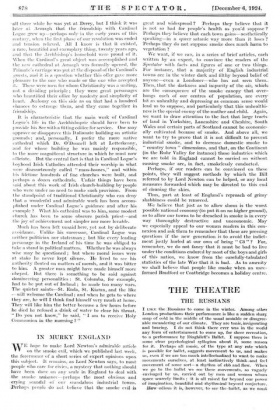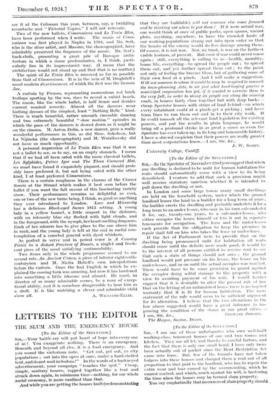THE THEATRE
THE RUSSIANS
I LIKE the .Russians to come in the winter. Among other London productions their performance. is like a sudden sharp snap of cold in the middle of the usual amiable or disagree- able meandering of our climate. They are tonic,-invigorating and bracing. I do not think there ever was in the world any form of-entertainment to come up, for sheer recreation, to a performance by Diaghileff's Ballet. 'I suppose there is some clear psychological syllogism about it, some ,reason for it. Perhaps all music, of the type at any rate. which is possible for ballet, suggests movement to us, and makes us, even if we are too much intellectualized to want to make movements ourselves, at least instinctively think.-and feel movement of some sort—a rhythm of ebb and flow. -When we go to the .ballet we see these movements, so vaguely • envisaged by us, carried, out by men and women whom space scarcely limits ; it is all -raised far beyond our power of imagination,- beautiful and rhythmical beyond conjecture. -How odious it is,. however, to see Ithe- ballet, as we must
see it at the coliseum this • year, between, say, a twiddling moustache and " Pictorial Topics," I will not reiterate.
Two of the new ballets, Cimarosiana and Le Train Bleu, have been performed when I write. The music of Cima- rosiana was first played in Naples in 1794, and Mr. Sert, who is the dicor artist, and Massine, the choreographist, have admirably preserved the fragrance of the music. Mr. Serf's back-cloth, presenting a great pile of Baroque archi-
• teeture in which a dome predominates, is, I think, parti- cularly fine in its impressionist way. (I mean that the architecture would not stand up and that that is no matter.)
The spirit of Le Train Bleu is removed as far as possible from that of C'imarosiana. It is in the vein of M. Diaghilefrs usual modern divertissement, of which the first was the famous Jew.
A curtain by Picasso, representing momentous red brick trollops sporting by the sea, rises to reveal a cubist beach. The music, like the. whole ballet, is half ironic and derides current musical comedy. Almost all the dancers wear bathing dresses of the simplest, least " Bathing Belle " kind. There is much beautiful, rather uncouth ensemble dancing and two extremely beautiful " slow motion " episodes in which the pace of the dancers is slowed down as it might be on the cinema. M. Anton Dolin, a new dancer, gave a really wonderful performance in this, as did Mme. Sokolova, but La Nijinska (the choreographist) and M; Woizikovsky did not have so much opportunity.
A personal impression of Le Train Bleu was that it was not a ballet to see, so to say, on an empty stomach. I mean that if we had all been sated with the more classical ballets, Les Sylphides, Prince Igor and The Three Cornered Hat, we must have found it exquisitely piquant, and should prob- ably have preferred it, but not being sated with the other kind, I at least preferred Cimarosiana.
There is a certain roughness in the charms of the Chauve Souris at the Strand which makes it best seen before the ballet if you want the full savour of this fascinating variety show. Their performance remains as delightful as ever, one or two of the new turns being, I think, as good as anything they ever. introduced to London. Love and Hierarchy has a delicious Black-eyed Susan 1815 setting. A young lady in a yellow bonnet, a little seaport in the distance, with an intensely blue sky flecked with light clouds, and i n.the foreground, with the nymph, her heart-melting dragoons. Each of her adorers has to give place to the one above him in rank, and the young lady is left at the end in rueful con- templation of a corseted general with dyed whiskers.
As perfect in verve and in period sense is A Country Picnic in a distant Province of Russia, a ringlet and frock- coat piece of the most satisfying sentimentality.
Two items only in the whole programme seemed to me second rate, An Ancient Cameo, a piece of inferior eighteenth- centuryism and M. Nicita Balieff's own interpolations before the curtain. Once the bad English in which he ex- plained the coming turn was amusing, but now it has hardened into something a little irksome and absurd. He must, as director of so many admirable scenes, be a man of excep- tional ability, and it is somehow disagreeable to hear him as a droll. It is like watching a clever and admirable child



















































 Previous page
Previous page